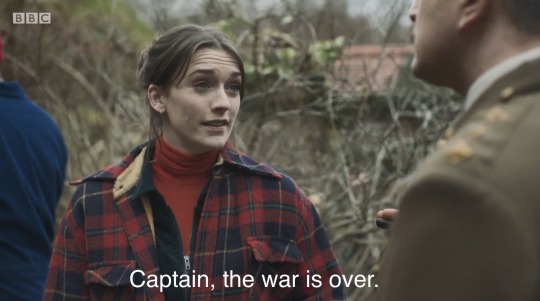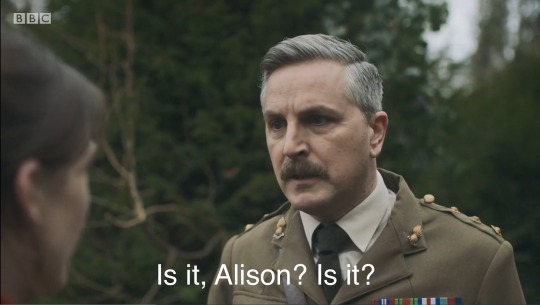#like the parrallels between pat and cap are surprisingly similar
Text
A Brief Analysis of the Captain
So there is this moment in Redding Weddy that I absolutely adore, which is this line:


I love it because i feel like it gives us a lot of insight into the Captain’s character. We have seen time and time again throughout the show that the Captain cannot let go of the war, and a lot of the time it is meant to be lighthearted or played for laughs, but this line is so filled with a sense of anguish and almost desperation. I feel like it really shows that the Captain really can’t accept that the war is over, because for him it isn’t.
I think there are two main aspects to this. The first one is that he can’t let go of the war because of the way it affected and shaped his life. It is shown multiple times throughout the show that the Captain bases a lot of his identity on his role and position in the war. He is literally known by everyone as ‘the Captain’ and he immediately takes the role of the leader of the ghosts whenever he can (especially in the first two seasons). His role in the war is something he clearly holds in great regard, and I don’t think he quite knows who he is without it anymore.
It is also almost certain that the Captain has trauma from the war, possibly even some form of ptsd. Living through a war is an incredibly traumatic thing to go through, regardless of whether or not you are a soldier fighting, and we do know due to his ribbons that the Captain fought in the front lines later in the war. There are several moments where the Captain acts or reacts in ways that are mostly considered odd or silly, and while a lot of the time it is played for laughs (and is very funny), and a lot of those moments could be read as him reacting in that way due to some trauma response. Having trauma from a certain event, especially something as big as a war, can make it almost impossible to let go of or move on from.
After World War 2 ended, everyone struggled to adjust into a peaceful life to some degree. German playwright Wolfgang Borchert compared men serving on the front line to ‘puppets on a string’. Peace was metaphorically cutting those strings, giving rise to the growing feeling of disorientation that many men faced, now having to be in charge of their own lives now after so many years of having a strict order they followed during the war. This level of disorientation was experienced by virtually everyone, with varying degrees of intensity, and the Captain would’ve been no exception. It is very clear that the Captain based a lot of his own identity on his title and position during the war, and the nature of his personality (being a logical leader who likes routine and order) means that he was well suited to the military life he led. We can generally infer that the Captain died quite shortly after the war had ended (given he is still wearing his uniform but has his ribbons). This means that while many people could adjust to a normal peaceful life after the war, the Captain didn’t have much time to adapt to the reality of peace before he became a ghost, adding the disorientation that he would’ve already been feeling. It really is no wonder that the Captain clings so tightly to the war, given it made up such a significant part of his life and during the time when he would’ve started to move on from the war, he died.
The second aspect to this is the fact that the Captain is dealing with a more metaphorical war inside of his mind. The Captain obviously grew up and lived in a very repressed time period, where nothing taboo was ever talked about or acknowledged, and it was normal for parents to be emotionally distant towards their children. Homosexuality was illegal, of course, and if someone was convicted of sodomy (as it was legally referred to as), the punishment was incredibly severe. Although during the war years homosexuality was largely excused (because of the blackouts, men could find each other in complete darkness and not be caught, and sex between men in places such as the navy and the army was largely accepted as a way to relieve sexual needs due to the lack of women present. Also authorities had much more pressing matters to deal with), it was still illegal (due to the Criminal Law Amendment Act in 1885), and after the war there was a rise in persecutions of homosexuals (one of the most famous being Alan Turing).
The illegality of homosexuality, as well as the taboo nature of the topic, all culminates in the Captain’s method of burying anything regarding his sexuality, possibly to the point where he himself is not fully aware of it. Coming to terms with the fact that he is, in fact, gay, would’ve been incredibly hard for the Captain, resulting in the war in his mind between his true self and the deeply ingrained societal norms of his time. Having to deal with internalised homophobia of any kind is incredibly difficult, not to mention having to deal with it knowing that in your time it was illegal. Obviously the Captain has grown a lot, and has evidently accepted himself (given his second attempt at coming out in 3x5, before getting interrupted by the art class), but that doesn’t mean that the journey to get to that point would’ve been easy.
Struggling to dealing with the fact that a literal war is over while also going through a metaphorical mental war all culminates in Cap’s genuine inability to let go of the war, as this line perfectly demonstrates.
#cat.txt#bbc ghosts#bbc ghosts the captain#the captain#when I say i think about this moment daily i am not joking like I genuinely think about this line a lot#i know not a lot of what I said is new information or anything people haven’t said before but i wanted to put my thoughts into words#i have been thinking about this a *lot*#also may i just say that cap isn’t the only ghost who can’t let go of their past bc all of the ghosts struggle with it#it’s just that it is especially true in cap’s case#i think pat struggles with it a lot too - like with being unable to let go of carol and creating clubslike he used to do in scouts#and even sometimes treating the ghosts like he used to treat the scouts he taught#like the parrallels between pat and cap are surprisingly similar#maybe i’ll make a post on it#also I am very very proud of the growth that cap has had throughout this series#i feel like that is important to say idk why#cap my beloved
171 notes
·
View notes